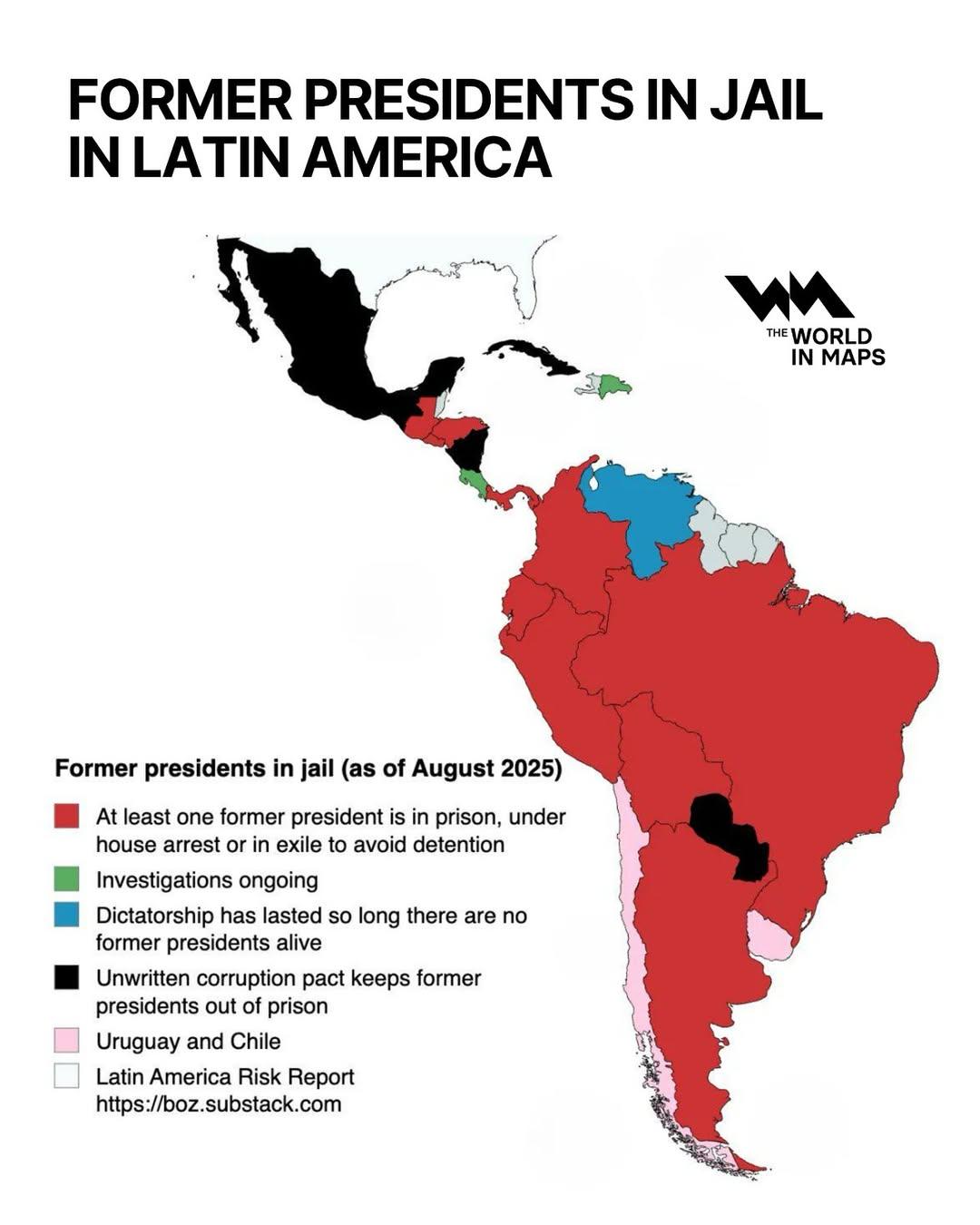Map of Former Presidents in Jail in Latin America


Marcus Rodriguez
Historical Geography Expert
Marcus Rodriguez specializes in historical cartography and geographic data analysis. With a background in both history and geography, he brings unique...
Geographic Analysis
What This Map Shows
This map visualizes the complex political landscape of Latin America, specifically focusing on the instances of former presidents who have faced incarceration. It highlights the countries where these leaders have been jailed, offering a stark reminder of the political turmoil and corruption that has marked the region's history. As we delve deeper into this topic, it becomes evident that the legal troubles of these former leaders reflect broader trends in governance, accountability, and public trust in political institutions.
Deep Dive into Political Incarceration in Latin America
Latin America has a tumultuous political history, often defined by instability, coups, and corruption. The phenomenon of former presidents being jailed is not just a random occurrence; it symbolizes larger systemic issues within the political framework of these nations. In recent decades, several high-profile former leaders have been accused of corruption, fraud, and abuse of power. For example, in Brazil, former President Luiz Inácio Lula da Silva was convicted on corruption charges, though he was released after a Supreme Court ruling allowed him to appeal his case from outside prison.
Interestingly, corruption scandals like the Operation Car Wash in Brazil have revealed intricate networks of bribery linking politicians, business leaders, and even foreign investors. This has led to a wave of political accountability, where former leaders are no longer immune to prosecution. According to Transparency International's Corruption Perceptions Index, many Latin American countries score poorly, underscoring the urgent need for reform and integrity in governance.
In countries like Guatemala, former President Otto Pérez Molina was jailed following accusations of leading a massive customs fraud scheme. His arrest marked a significant moment in Guatemala's fight against corruption, reflecting a growing trend where citizens demand accountability from their leaders. Similarly, in Honduras, former President Juan Orlando Hernández faced extradition to the U.S. on drug trafficking charges, illustrating how former leaders can also be entangled in international legal battles.
The implications of these political incarcerations extend beyond individual cases; they represent a societal shift towards greater transparency and justice. Citizens in countries like Peru, where former President Pedro Pablo Kuczynski was imprisoned, are increasingly vocal about their expectations for honest governance. This growing demand for accountability can reshape the political landscape, potentially leading to more democratic practices in the future.
Regional Analysis
When examining the map, it’s clear that the phenomenon of former presidents in jail is not uniform across Latin America. Brazil and Guatemala stand out with a significant number of former leaders facing legal challenges. Brazil's Operation Car Wash has not only implicated Lula but also several other high-ranking officials, creating a ripple effect in the political sphere. The country has seen a shift in public sentiment, with many citizens supporting the prosecution of corrupt leaders.
In contrast, countries like Chile and Argentina have experienced different political dynamics. While Chile has not seen former presidents imprisoned recently, Argentina has its share of leaders facing scrutiny. For instance, former President Cristina Fernández de Kirchner has been implicated in various corruption cases, yet she has managed to maintain a strong political presence, showcasing the complexities of legal accountability in different historical contexts.
Moreover, countries like Venezuela have their unique challenges. The political situation there is marked by a crisis of legitimacy, where former leaders face accusations of human rights abuses rather than traditional corruption charges. This highlights how the reasons for imprisonment can vary significantly across the region, influenced by historical, social, and political contexts.
Significance and Impact
The implications of former presidents being jailed in Latin America are profound. This trend signifies a growing intolerance for corruption, potentially paving the way for stronger democratic institutions. However, it also raises questions about the politicization of the judiciary, where legal systems may be used as tools for political gain or retaliation.
As Latin America continues to grapple with its political identity, the role of accountability remains crucial. The increasing visibility of these cases encourages citizens to engage more actively in the political process, demanding transparency and justice. The future of governance in Latin America may hinge on the ability to address corruption effectively and to ensure that leaders are held accountable, fostering a culture of integrity.
In conclusion, the map of former presidents in jail serves as a powerful visual representation of the ongoing struggle for justice and accountability in Latin America. It underscores a critical question for the region: Can the political landscape evolve to promote genuine democracy, or will the legacy of corruption continue to overshadow progress? This ongoing narrative is essential as we observe the political developments in these nations in the years to come.
Visualization Details
- Published
- August 28, 2025
- Views
- 72
Comments
Loading comments...